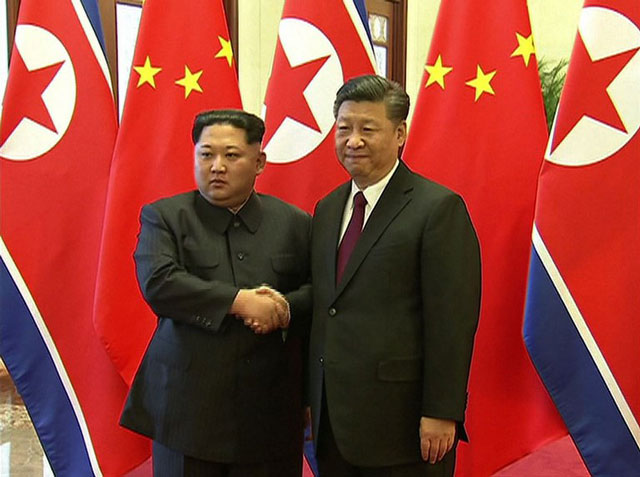
Seoul, South Korea | AFP | North Korean leader Kim Jong Un came away from his fourth meeting with Chinese President Xi Jinping with his hand strengthened in nuclear talks with the US, analysts say, even as Seoul urged him to do more.
Beijing is Pyongyang’s sole major ally and key provider of trade and aid, their ties forged in the blood of the Korean War.
The relationship had soured in recent years as China became frustrated with its neighbour’s nuclear antics but warmed dramatically in 2018 as Kim and Xi met three times, each occasion coming shortly before Kim’s summits with US President Donald Trump and the South’s Moon Jae-in.
A second Kim-Trump meeting is expected soon, and the North Korean and Chinese leaders had far deeper security discussions this time in Beijing than in any of their talks last year, pointed out Lim Eul-chul, professor of North Korean studies at Kyungnam University.
Kim and Xi agreed to jointly study and co-ordinate “the management of the situation of the Korean peninsula and the denuclearisation negotiations in particular”, the North’s official KCNA news agency reported.
That will give China a central role in future US-North Korean discussions, Lim told AFP, even if it is not in the room at the time.
“Closer ties between China and North Korea in pursuit of a security alliance will not be welcomed by the US,” Lim told AFP.
“It could be a challenge to Washington to face Pyongyang officials with firm backing from their neighbour.”
The negotiation process has stalled since Kim and Trump’s first high-profile encounter in Singapore, where they signed a vaguely-worded statement on denuclearisation and have since disagreed on what it means.
Pyongyang is demanding the easing of sanctions imposed over its nuclear weapons and ballistic missile programmes, while Washington insists they must remain in place until it gives up its atomic arms — something it has made no public promise to do.
China — which regards northeast Asia as its back yard and is engaged in a range of disputes of its own with the US, including a trade spat that threatens to upset the global economy — also wants the sanctions relaxed.
Xi agreed with the “principled issues” raised by North Korea in talks with the US and that its “reasonable points of concern should be resolved properly”, according to Pyongyang’s official KCNA news agency.
Pyongyang has a long history of playing major powers off against each other, with Kim’s predecessor and grandfather Kim Il Sung adept at winning backing from the then Communist rivals Beijing and Moscow in turn.
“North Korea uses engagement with China to reinforce its leverage with the United States, and vice versa,” said former US diplomat and Korea specialist Mintaro Oba.
It could be “annoying” for Pyongyang to have to face Beijing emphasising its “superiority” in their relationship, he tweeted, but that was “a small price to pay for a strengthened position” in talks with Trump.
– ‘Tangible achievements’ –
Expectations of a second Trump-Kim summit have mounted in recent days, with the US leader saying the two were negotiating over its location and Seoul’s President Moon Jae-in saying Kim’s Beijing trip was a sign it was “imminent”.
Speculation over possible locations has swirled among Korea-watchers, with the candidates including Hanoi in Communist-ruled Vietnam, Ulan Bator in Mongolia — which Kim can reach by train — Sweden, which has a long history of mediating between Pyongyang and Washington, and even the US state of Hawaii.
But whether a meeting will take place still depends on what Pyongyang brings to the table in preliminary talks between the two, said Kim Han-kwon, analyst at the Korea National Diplomatic Academy.
The North needs to take “more bold, practical measures for denuclearisation” Moon said Thursday – a departure for the South Korean leader, who has stressed engagement with Pyongyang to bring it to the negotiating table.
That has prompted criticism from conservatives that Moon was conceding too much while gaining little in return.
Moon also urged Washington to take “corresponding measures”, but acknowledged that the Singapore summit agreement was “somewhat vague” and that there was international scepticism over Kim’s sincerity.
Moon’s call was driven by a belief that denuclearisation talks needed to produce “tangible achievements” this year, said Cho Seong-ryoul, a former senior researcher at Seoul’s Institute for National Security Strategy.
“There is a gap between Pyongyang and Washington over what it means to denuclearise,” he said. “Moon is trying to narrow that gap now.”
kjk/slb/fa/ecl
 The Independent Uganda: You get the Truth we Pay the Price
The Independent Uganda: You get the Truth we Pay the Price





